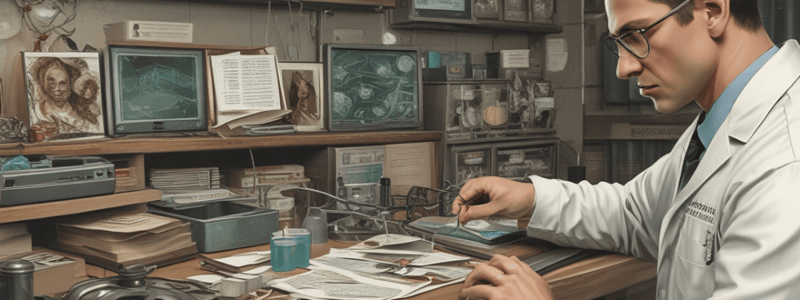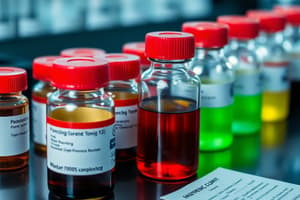Podcast
Questions and Answers
What information must be documented on the chain-of-custody form for a specimen?
What information must be documented on the chain-of-custody form for a specimen?
- Name and identifying information of the patient, body, subject, or object the specimen came from (correct)
- Only the signature of the person who obtained the specimen
- The type of biohazard bag used for transportation
- The date and location of the laboratory analysis
Why is it essential to maintain the integrity of the chain-of-custody process?
Why is it essential to maintain the integrity of the chain-of-custody process?
- To increase the efficiency of laboratory analysis
- To reduce the cost of transportation
- To prevent tampering with the specimen during transportation (correct)
- To ensure the specimen is analyzed quickly
Which of the following scenarios may require initiating and following a chain-of-custody process?
Which of the following scenarios may require initiating and following a chain-of-custody process?
- Urine drug testing for employment purposes (correct)
- DNA analysis for paternity testing
- Blood glucose testing for diabetes management
- None of the above
What is the purpose of using a biohazard bag with a permanent seal?
What is the purpose of using a biohazard bag with a permanent seal?
Which type of testing may involve toxicology testing of substances?
Which type of testing may involve toxicology testing of substances?
Why is special handling of forensic specimens crucial?
Why is special handling of forensic specimens crucial?
Who must sign the chain-of-custody form during transportation of the specimen?
Who must sign the chain-of-custody form during transportation of the specimen?
Which of the following is an example of a forensic specimen?
Which of the following is an example of a forensic specimen?
Why is it essential to transport microbiology specimens quickly?
Why is it essential to transport microbiology specimens quickly?
What is a potential consequence of delaying delivery of specimens from clinics to reference laboratories?
What is a potential consequence of delaying delivery of specimens from clinics to reference laboratories?
What type of transport system is usually used in an inpatient setting?
What type of transport system is usually used in an inpatient setting?
What is a precaution to consider when using pneumatic tube systems for transport?
What is a precaution to consider when using pneumatic tube systems for transport?
What is the purpose of inner padding in pneumatic tube systems?
What is the purpose of inner padding in pneumatic tube systems?
What is essential for the delivery process to include?
What is essential for the delivery process to include?
Why is prompt delivery of specimens from clinics or blood-collection stations to reference laboratories necessary?
Why is prompt delivery of specimens from clinics or blood-collection stations to reference laboratories necessary?
What types of specimens require prompt delivery to the laboratory?
What types of specimens require prompt delivery to the laboratory?
What is an important aspect of handling specimens in a laboratory setting?
What is an important aspect of handling specimens in a laboratory setting?
Why is it essential to coordinate with clinical staff when collecting blood samples for timed tests?
Why is it essential to coordinate with clinical staff when collecting blood samples for timed tests?
What is the purpose of verifying the patient's wristband or verbally verifying with the patient?
What is the purpose of verifying the patient's wristband or verbally verifying with the patient?
Why is it necessary to wear gloves when handling patient-collected, nonblood specimens?
Why is it necessary to wear gloves when handling patient-collected, nonblood specimens?
What should a phlebotomist do between collecting each specimen?
What should a phlebotomist do between collecting each specimen?
What is the importance of correct handling of specimens?
What is the importance of correct handling of specimens?
What type of test requires a specific timing, such as a 2-hour postprandial blood glucose level?
What type of test requires a specific timing, such as a 2-hour postprandial blood glucose level?
Why is it important to position the label correctly on the container?
Why is it important to position the label correctly on the container?
What is a unique challenge presented by forensic specimens?
What is a unique challenge presented by forensic specimens?
What is the purpose of the Federal Drug Testing Custody and Control Form (CCF)?
What is the purpose of the Federal Drug Testing Custody and Control Form (CCF)?
What can urine drug tests usually detect?
What can urine drug tests usually detect?
Why are specific guidelines essential for collecting drug testing specimens?
Why are specific guidelines essential for collecting drug testing specimens?
What is a requirement for phlebotomists involved in drug testing?
What is a requirement for phlebotomists involved in drug testing?
What industry standard is often followed for workplace drug testing?
What industry standard is often followed for workplace drug testing?
What is the primary purpose of workplace drug testing?
What is the primary purpose of workplace drug testing?
What is a benefit of using the Federal Drug Testing Custody and Control Form (CCF)?
What is a benefit of using the Federal Drug Testing Custody and Control Form (CCF)?
Which type of specimen requires special handling and protection from shock and vibration?
Which type of specimen requires special handling and protection from shock and vibration?
What is the primary function of an automated carrier system in a laboratory?
What is the primary function of an automated carrier system in a laboratory?
What is the purpose of a pneumatic tube system in a hospital?
What is the purpose of a pneumatic tube system in a hospital?
What is the chain of custody in the context of laboratory specimens?
What is the chain of custody in the context of laboratory specimens?
What is the consequence of sending a specimen to the incorrect department?
What is the consequence of sending a specimen to the incorrect department?
What is the purpose of using a secure container in a pneumatic tube system?
What is the purpose of using a secure container in a pneumatic tube system?
What is the final step in preparing a specimen for transportation in a pneumatic tube system?
What is the final step in preparing a specimen for transportation in a pneumatic tube system?
What is the purpose of the alarm or light in a pneumatic tube system?
What is the purpose of the alarm or light in a pneumatic tube system?
A chain-of-custody form only requires the signature of the person who obtained the specimen.
A chain-of-custody form only requires the signature of the person who obtained the specimen.
Forensic specimen analysis only involves DNA analysis and rape test kits.
Forensic specimen analysis only involves DNA analysis and rape test kits.
Workplace drug testing does not require following chain-of-custody guidelines.
Workplace drug testing does not require following chain-of-custody guidelines.
Toxicology testing only involves analysis of blood samples.
Toxicology testing only involves analysis of blood samples.
Specimens for forensic analysis do not require special handling.
Specimens for forensic analysis do not require special handling.
A biohazard bag with a permanent seal is not necessary for transporting specimens.
A biohazard bag with a permanent seal is not necessary for transporting specimens.
The delivery of specimens from clinics or blood-collection stations to reference laboratories should be delayed to allow for processing and preparation.
The delivery of specimens from clinics or blood-collection stations to reference laboratories should be delayed to allow for processing and preparation.
Pneumatic tube systems are not suitable for transporting microbiology specimens.
Pneumatic tube systems are not suitable for transporting microbiology specimens.
Hand delivery is a suitable method for transporting specimens to a reference laboratory.
Hand delivery is a suitable method for transporting specimens to a reference laboratory.
Forensic specimens do not require special handling and protection from shock and vibration.
Forensic specimens do not require special handling and protection from shock and vibration.
Toxicology testing does not involve the analysis of biological specimens.
Toxicology testing does not involve the analysis of biological specimens.
Workplace drug testing does not require specific guidelines for collecting and handling specimens.
Workplace drug testing does not require specific guidelines for collecting and handling specimens.
Timed tests require a specific timing, such as a 2-hour postprandial blood glucose level, and phlebotomists are responsible for ensuring patients have satisfied the testing requirements.
Timed tests require a specific timing, such as a 2-hour postprandial blood glucose level, and phlebotomists are responsible for ensuring patients have satisfied the testing requirements.
Phlebotomists are not responsible for coordinating with clinical staff when collecting blood samples for timed tests.
Phlebotomists are not responsible for coordinating with clinical staff when collecting blood samples for timed tests.
The label on a specimen container should be positioned on the lid, not on the container.
The label on a specimen container should be positioned on the lid, not on the container.
Wearing gloves is not necessary when handling patient-collected, nonblood specimens.
Wearing gloves is not necessary when handling patient-collected, nonblood specimens.
Phlebotomists do not need to change gloves between each specimen.
Phlebotomists do not need to change gloves between each specimen.
Incorrect handling of specimens does not affect the quality of the specimen.
Incorrect handling of specimens does not affect the quality of the specimen.
The phlebotomy team is not responsible for accessing and processing all specimens that come into the laboratory for testing.
The phlebotomy team is not responsible for accessing and processing all specimens that come into the laboratory for testing.
Verifying the patient's wristband or verbally verifying with the patient is not necessary.
Verifying the patient's wristband or verbally verifying with the patient is not necessary.
Flashcards are hidden until you start studying
Study Notes
Chain of Custody
- A chain of custody form must be completed each time a specimen is transferred, documenting the identity of everyone who has handled the specimen.
- The form requires the patient's name and identifying information, the person who obtained and processed the specimen, and the date, location, and signature of the person attesting to the specimen's correctness.
- The signature and date of every person who had possession of the specimen are also required.
Specimen Handling
- Specimens must be labeled correctly and placed in a biohazard bag with a permanent seal to ensure no tampering.
- Forensic specimens require special handling due to their potential decomposition, limited quantity, or need for analysis in extreme environments.
- Toxicology testing of substances after poisoning or substance abuse is also involved in forensic specimens.
Delivery of Specimens
- Prompt delivery of specimens from clinics or blood-collection stations to reference laboratories is crucial.
- Delays in delivery can affect test results, especially for glucose, phosphorus, and enzymes.
- Microbiology specimens must be transported quickly to ensure timely identification of microorganisms.
Specimen Delivery Methods
- Hand delivery directly to a reference laboratory, following timeliness of delivery guidelines.
- Pneumatic tube systems, usually in an inpatient setting, with enhanced mechanical reliability and increased transport distance and speed.
- Automated carrier using a transport vehicle, such as a motorized container car that travels on a network of tracks.
Pneumatic Tube Systems
- Used in hospitals to send and receive laboratory specimens, patients' records, medications, and bills.
- Each sending station has a large metal box with lockable doors or pass-code entries for security and confidentiality.
- The tube network runs throughout the hospital and connects to receiving stations.
Chain of Custody Process
- Maintains control of and accountability for each specimen from collection to disposal.
- Collecting forensic specimens can require special training or experience and supervision.
- Unlike clinical specimens, forensic specimens can be in any condition, clotted, or in unacceptable containers.
Drug Testing
- The Department of Health and Human Services initiated federal drug testing, mandatory for some government employees and private-sector employees.
- Workplace drug testing often follows the U.S. Department of Transportation's mandated testing regulations.
- The Federal Drug Testing Custody and Control Form (CCF) documents the handling and storage information for specimens from collection to disposal.
- Urine drug tests can detect marijuana use within the past week and the use of cocaine, heroin, and other illegal drugs within the past 2 days.
Chain of Custody
- Documenting identity on the chain-of-custody form is required for every person handling a specimen, including those who obtained and processed it, transported it, and had possession of it for any amount of time.
- The form includes patient information, specimen details, date, location, and signature of the person attesting to the specimen's identity and documentation.
Labeling and Packaging
- Correct labeling of specimens is crucial, including patient name, date and time of collection, and specimen type, with immediate labeling after collection.
- Specimens must be placed in a biohazard bag with a permanent seal to prevent tampering.
Transporting Specimens
- Hand delivery or pneumatic tube systems can be used to transport specimens, ensuring timely delivery and proper handling.
- Special considerations are needed for microbiology specimens, which require quick transportation to the laboratory for analysis.
Forensic Specimens
- Forensic laboratory analysis involves various specimen types, including those from crime scenes, autopsies, and toxicology testing.
- Special handling of forensic specimens is crucial to ensure the integrity of the evidence.
Specimen Handling
- Phlebotomy teams accept and accession specimens, ensuring correct handling and processing.
- Handling requirements include pre-collection specifics, such as time, temperature, and light protection, to ensure high-quality test results.
Studying That Suits You
Use AI to generate personalized quizzes and flashcards to suit your learning preferences.




